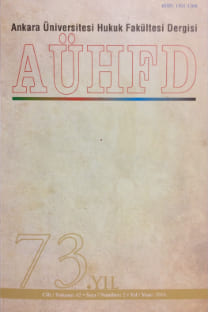AMERİKA BİRLEŞİK DEVLETLERİ’NDEKİ ENGELLİ TANIMI HAKKINDA BİR İNCELEME
Engelli, engellilik, özürlü, özürlülük
An Analysis About Disability Definition in The United States of America
Disabled, disability, handicapped, handicap,
___
- Befort, Stephen F. - Holly Lindquist Thomas, “The ADA in Turmoil: Judicial Dissonance, the Supreme Court’s Response, and the Future of Disability Discrimination Law”, Oregon Law Review (Vol. 78,1999), ss. 27-104.
- Bernstein, Josh, “The Efforts of Texas Courts to Disable Disability Law in Texas”, Texas Forum on Civil Liberties & Civil Rights (Vol. 2:43 1995), ss. 43-68.
- Blanck, Peter-Ann Wilichowski-James Schmeling, “Disability Civil Rights Law and Policy: Accessible Courtroom Technology”, William & Mary Bill of Rights Journal (Vol 12:825 2004), ss. 825-842.
- Bowe, Frank G., Physical, Sensory and Health Disabilities, An Introduction, Hofstra University, New Jersey, 2000.
- Chodak, Robin, “Recent Decisions-Civil Rights-Handicap Discrimination Law, Pennsylvania Excludes Obesity From Protection Under The Pennsylvania Human Relations Act- Civil Service Commission v. Pennsylvania Human Relations Commission, 591 A.2d 281 (Pa. 1991)”, Temple Law Review (Vol. 65 1992), ss. 623-644.
- Chorpening, Jennifer, “Genetic Disability: A Modest Proposal To Modify The ADA To Protect Against Some Forms Of Genetic Discrimination”, North Carolina Law Review (Vol. 82 2004), ss. 1441-1481.
- Christoffel, Tom, Health and the Law, A Handbook for Health Professionals, 1985.
- Gilbert, Justin S., “Prior History, Present Discrimination, and the ADA’s “Record of” Disability”, The University of Memphis Law Review (Vol. 31 2001), ss. 659-676.
- Harris, Lynn J., “The Americans With Disabilities Act And Australia’s Disability Discrimination Act: Overcoming The Inadequacies”, Loy. L. A. Int’l & Comp. L. Rev (Vol.22:51 1999), ss. 51-98.
- Kearney, Deborah, Reasonable Accommodations, Job Descriptions in the Age of ADA, OSHA, and Workers’ Comp, 1994.
- Kramer, Karen M.-Arlene B. Mayerson, “Obesity Discrimination In The Workplace: Protection Through A Perceived Disability Claim Under The Rehabilitation Act And The Americans With Disabilities Act”, California Western Law Reivew (Vol. 31 1994), ss. 41-72.
- Limas, Vicki J., “Significiant Employment Law Decisions In The 1997-98 Term: A Clarification of Sexual Harassment Law And A Broad Definition Of Disability”, Tulsa Law Journal (Vol. 34:307 1999), ss. 307-328.
- Long, Alex, “State Anti-Discrimination Law As A Model For Amending The Americans With Disabilities Act”, University of Pittsburgh Law Review (Vol. 65:597 2004), ss. 597-654.
- Lynch, Andrew, “Is obesity a disability – actual or perceived – under the Disability Discrimination Act 1992?”, Deakin Law Review, 1996, ss. 161-182.
- Malloy, S. Elizabeth Wilborn, “Something Borrowed, Something Blue: Why Disability Law Claims Are Different”, Connecticut Law Review (Vol. 33:603 2001), ss. 603-666.
- Miller, Stephanie Proctor, “Keeping The Promise: The ADA and Employment Discrimination on the Basis of Psychiatric Disability”, California Law Review (Vol.85:701 1997), ss. 701-747.
- Naef, Andrea Kloehn, “Toyota Motor Manufacturing v. Williams: A Case of Carpal Tunnel Syndrome Weakens the Grip of the Americans with Disabilities Act”, Pepperdine Law Review (Vol. 31:575,2004), ss. 575-608.
- O’Hara, Milena D., ““Please Weight To Be Seated”: Recognizing Obesity As A Disability To Prevent Discrimination In Public Accommodations”, Whittier Law Review (Vol. 17 1996), ss. 895-954.
- Okur, Nejla, Özürlülere Yönelik Örgütlenmenin İncelenmesi, T.C. Başbakanlık Özürlüler İdaresi Başkanlığı Yayınları/15, Aralık 2001, Ankara.
- Panol, Zenaida Sarabia - Michael McBride, “Basılı Yayınlarda Özürlülük İmajı: Tutumun Etkileri Hakkında İnceleme”, Çeviren Betül Yalçın, ÖZ-VERİ Dergisi, Eylül 2004, C. 1, S. 1, ss. 111-128.
- Perlin, Michael L., “Their Promises Of Paradise: Will Olmstead V. L.C. Resuscitate The Constitutional “Least Restrictive Alternative” Principle In Mental Disability Law?”, Houston Law Review (37:999 2000), ss. 999-1054.
- Regulations To Implement The Equal Employment Provisions Of The Americans With Disabilities Act – Part 1630.
- Rosenthal, Lawrence D., “Can’t Stomach The Americans With Disabilities Act? How The Federal Courts Have Gutted Disability Discrimination Legislation In Cases Involving Individuals With Gastrointestinal Disorders And Other Hidden Ilnesses”, Catholic University Law Review (Vol. 53:449 2004), ss. 449-498.
- Rothstein, Laura F., “Teaching Disability Law”, Journal of Legal Education, Volume 48, Number 2, (June 1998), ss. 297-309.
- Stone, Donald H., “Handicap Law”, University of Richmond Law Review (Vol. 22:637 1988), ss. 637-665.
- Taussig, William C. , “Weighing In Against Obesity Discrimination: Cook v. Rhode Island, Department of Mental Health, Retardation, And Hospitals And The Recognition Of Obesity As A Disability Under The Rehabilitation Act And The Americans With Disabilities Act”, Boston College Law Review (Vol.35:927 July 1994), ss. 927-963.
- Uşan, M. Fatih, İş Hukuku’nda Sakat İstihdamı, Türkiye Sağlık İşçileri Sendikası Yayını 1999.
- Weber, Mark C., “Reciprocal Lessons Of The ADA And European Disability Law”, ASIL Proceedings 1999, Am Soc’y Int’l L. Proc. , ss. 338-341.
- Wenbourne, Nick, “Disabled Meanings: A Comparison of the Definitions of “Disability” in the British Disability Discrimination Act of 1995 and the American with Disabilities Act of 1990”, Hastings Int’l & Comp. L. Rev. (Vol.23:149 1999), ss. 149-172.
- Zames, Doris – Fleischer and Frieda Zames, The Disability Rights Movement, From Charity to Confrontation, Temple University Pres 2001, Philadelphia.
- Zioze, Dean G., “Employment Law-Morbid Obesity Considered Perceived Disability Under Section 504 of the Rehabilitation Act-Cook v. Rhode İsland,10 F.3d 17 (1st Cir. 1993), Suffolk University Law Review (Vol. XXVIII:823 1994), ss. 823-832.
- http://www.obesityresearch.org/cgi/content/full/9/12/788#B132 (15.01.2006).
- ISSN: 1301-1308
- Yayın Aralığı: 4
- Başlangıç: 1943
- Yayıncı: Ankara Üniversitesi Hukuk Fakültesi
II. MEŞRUTİYET DÖNEMİ’NDE ADLİYE ve MEZÂHİP NEZARETİ’NDE BÜROKRATİK REFORM
SINIRAŞIRI ALACAKLARIN VE BANKA HESABININ HACZİ
Götz-sebastian HOK, Gökhan ERBAŞ C.
TÜKETİCİNİN MUTAD MESKENİ HUKUKU “Düşünsel Temeller”
ARAÇ MUAYENE HİZMETİNİN “ÖZELLEŞTİRİLMESİ
ULUSLARARASI CEZA MAHKEMESİ VE UYGULANABİLİR HUKUK
AKİT DIŞI BORÇ İLİŞKİLERİNE UYGULANACAK HUKUK HAKKINDAKİ AVRUPA TOPLULUĞU TÜZÜĞÜ (ROMA II)
AMERİKA BİRLEŞİK DEVLETLERİ’NDEKİ ENGELLİ TANIMI HAKKINDA BİR İNCELEME
